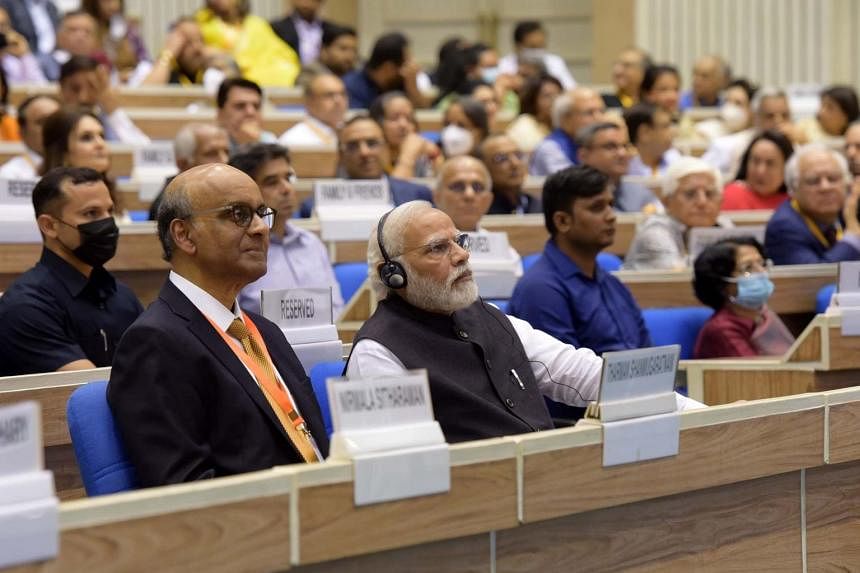NEW DELHI - Singapore Senior Minister Tharman Shanmugaratnam warned that the war in Ukraine could have "catastrophic ramifications" globally even as he highlighted the danger of turning away from an "open and integrated global order".
Mr Tharman, who is also Coordinating Minister for Social Policies, is on a seven-day visit to India. He delivered the inaugural Arun Jaitley Memorial Lecture in New Delhi on Friday (July 8).
Speaking on the topic Growth Through Inclusivity, Inclusivity Through Growth, Mr Tharman highlighted the multiple challenges facing the world at this point in what he called "a confluence of fragilities".
These include the prospect of stagflation with higher inflation and slower growth for a period of time; "escalating geopolitical tensions" due to the Ukraine war and deterioration of the "global commons" with shifts in the environment combined with the increased risk of the global spread of infectious diseases.
He said the Covid-19 pandemic has threatened social and economic gains made by developing nations in the last decade, particularly when it comes to learning outcomes with many girls failing to return to school.
On geopolitical tensions, he said: "The global system of rules and norms aimed at preserving peace and territorial integrity was never perfect. But what is happening in Ukraine is a major rupture and will have ramifications that go beyond just another war. And the ramifications could be catastrophic."
He further warned against protectionist tendencies, saying "let us not retreat from an open, integrated global order which has been hugely beneficial to all nations, including the largest nations.
"Economic interdependence does not assure us of peace. But it makes peace much more likely than a world of increasingly decoupled markets, technologies, data and payments. We must stay open and stay integrated. Achieving this will require geopolitical skill and leadership.”
His remarks come at a time of growing global protectionism. The war in Ukraine had contributed to rising food protectionism with countries including India restricting exports of different food items amid the growing threat of inflation.
The blockage of ports in Ukraine and the sanctions on Russia had resulted in shortages of wheat and other agriculture products, leading to food shortages globally.
"The risks of high inflation preceded Ukraine but are of course now accentuated," Mr Tharman said, noting that this was not even the most important problem.
“Critically, although the higher levels of inflation, and slow growth or a recession for a while, do not constitute the most important problems in the world, critically, they will erode political capital at the time when we need political capital, within nations and globally, to address much larger challenges, including the challenges of climate change, the global water crisis, and shrinking biodiversity.”
The Senior Minister also spoke at length about India, urging the South Asian country to "accelerate the pace of reforms” and highlighted how India required a growth rate of 8 per cent to 10 per cent over the next 25 years to lift average income and create more jobs.
He noted that the next decade in particular would be critical for India, which is currently going through a demographic dividend with 580 million Indians below the age of 25.
"That is a large number of people who need to be quickly skilled, given confidence, to own their own success in the workforce," he said.
And lastly, while appreciating growing multipolarity, Mr Tharman warned against the dangers of polarisation.
"That the world is becoming now more multi-polar is irreversible. That is a mark of success of the global economy - there are more poles of success and influence. That is irreversible."
He added: “But we must prevent a multipolar world from becoming a polarised world. That has to be the overriding objective.”
The memorial lecture is named after Mr Arun Jaitley, who was India's finance minister between 2014 and 2019. Mr Tharman noted that he had many meetings with Mr Jaitley.
Prime Minister Narendra Modi, who was also present at Friday's lecture, noted that India is preparing a road map for the coming 25 years but did not go into details.
"We do not consider reforms as a necessary evil but a win-win choice, in which there is national interest and public interest," said Mr Modi.
Mr Tharman was in north-eastern Assam on Tuesday to officiate the handover of the North East Skill Centre from ITE Education Services to the Assam government.


